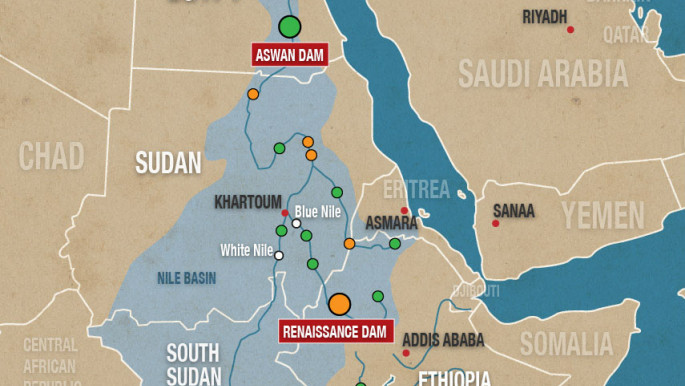Palacegate: Mohamed Ali calls on Egyptians to protest from their rooftops
In a Youtube video posted late Wednesday, Ali called for this unusal protest action amid a brutal crackdown by Egyptian authorities, hoping to "disrupt" the Egyptian regime by exhausting the army and police forces.
Rare protests broke out in Egypt last month after the businessman, from self-imposed exile in Spain, accused the president and the military of rampant corruption.
In Wednesday's video, Ali also called on Sisi to share the details of an agreement signed in 2015 between Egypt, Sudan, and Ethiopia to study the impact of the Renaissance Dam.
Egyptians fear that Ethiopia's planned Renaissance Dam will drastically reduce the amount of Nile water flowing to Egypt, causing water shortages and possibly famine.
 |
|
| [Click to enlarge] |
"This is our right after they prevented the cultivation of rice, sugar cane, and more in order to control water consumption."
There has been growing criticism on social media of Sisi and his government following the failure of negotiations with Ethiopia regarding its controversial Renaissance Dam project.
Ali, in a video released Sunday, accused Sisi and his ministers of being complicit in cutting off Egypt's lifeline, threatening them with execution.
Read more: Who is losing the Nile?
A new hashtag #Sisi_threw_away_the_Nile_waters, which was started by Ali, has been trending on Twitter.
Activists blamed Sisi for approving the building of the Renaissance Dam while not agreeing the details of water distribution with Ethiopia.
Mohamed Ali, who fled Egypt to Spain earlier this year, ignited a protest movement in Egypt last month, when he revealed that President Sisi had contracted his company to build several luxurious palaces using public money while the government enforced tough austerity measures on the public.The scandal has been dubbed "Palacegate". Sisi acknowledged that he had been building palaces but said he was building them for the Egyptian state rather than himself.
|
|
Egyptian authorities have responded to the protests with a brutal crackdown, detaining around 3,000 people over the last weeks including prominent academics, activists and lawyers.
Egypt passed a restrictive anti-protest law in 2013 after Sisi led the military ouster of Islamist president Mohamed Morsi and a renewable state of emergency remains in force.
Comment: Something had to give in Egypt
President Sisi regularly invokes his track record of bringing relative stability in a turbulent region and boosting the economic outlook after introducing harsh austerity reforms in 2016.
But the rallies calling for Sisi's removal struck a chord with Egyptians who have been bearing the brunt of these stringent economic reforms.
 |
Agencies contributed to this report.
Follow us on Twitter: @The_NewArab





 Follow the Middle East's top stories in English at The New Arab on Google News
Follow the Middle East's top stories in English at The New Arab on Google News


